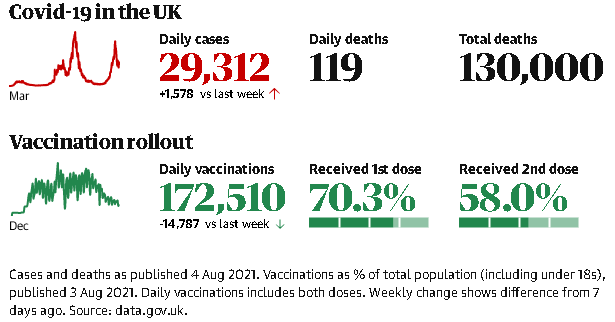
The risks and rewards of vaccinating UK children against Covid
Just weeks ago, the Joint Committee on Vaccination and Immunisation (JCVI) recommended that children over the age of 12 should only be vaccinated if they were extremely vulnerable or lived with someone at risk, citing concerns about an inflammatory heart condition linked to the Pfizer/BioNTech jab. Now the JCVI has tweaked that decision to allow children aged 16 and 17 to be routinely offered the vaccine.
What is the benefit of vaccinating children?
Most children do not suffer from severe illness due to Covid. But of the proportion of children who do develop any symptoms, studies estimate a fraction of that subset remain symptomatic for longer than four weeks. Like adults, children with underlying conditions – including neurodisabilities, Down’s syndrome or immunosuppression – are at much higher risk of falling seriously ill if they contract Covid. So even though the risks to children and teenagers from catching Covid are very low, they are not entirely absent.
Meanwhile, an argument has been made for vaccinating children to make it safer for them at school, as has the idea that vaccinating children could also be a strategy that could protect vulnerable adults who they could pass the disease on to. The public is also keen on the measure – a survey by the Office for National Statistics, published last month, found that almost 90% of parents in England would favour giving their children a vaccine if offered.
Given the elevated risk from Covid in extremely vulnerable children, the JCVI recommended vaccinating them in mid-July, but said it would continue to evaluate the landscape of emerging evidence and make changes if needed.

What are the risks?
Countries such as the US, Israel, France and Germany have all recommended over-12s be universally vaccinated. The UK’s medicines agency, the MHRA, approved the use of the Pfizer/BioNTech jab in over-12s in early June, but global reports of rare cases of myocarditis, an inflammatory heart condition, linked to the vaccine prompted the JCVI to limit its recommendation to vulnerable children in the UK.
There was pretty much “incontrovertible evidence” that the heart inflammation was a real safety signal, said Adam Finn, a professor of paediatrics at Bristol University and a JCVI member, adding that there were different rates of side-effects between the two sexes.
But the decision was controversial, with some scientists demanding that the data on which the JCVI relied be made publicly available. On Wednesday, a cohort of UK scientists published a preprint paper – under review at the Lancet journal – suggesting that vaccinating England’s 3.9 million 12- to 17-year-olds before school reopening in September was crucial given the risks of Covid illness, long Covid and school disruption posed by contracting Covid.
A separate consideration is vaccine supply. While the UK has millions of doses in place and on order, many countries have limited supply and have not even vaccinated their most at-risk populations. With the likelihood of more potentially vaccine-evading variants developing as a result of patchy vaccination, it makes sense to share vaccines – for no one is safe until everyone is safe. That would make vaccinating children a lower priority.
How will the vaccine be rolled out for 16- and 17-year-olds?
For now, vulnerable children over the age of 12, and those who live with at-risk adults, are being offered the vaccine. The latest JCVI recommendation isto routinely offer the first dose of the vaccine to healthy 16- and 17-year-olds, but the committee is still deliberating on when the second dose will be offered – this decision will depend on additional data that will be reviewed in the coming weeks. The first dose programme is expected to begin in the coming weeks, and will not require parental consent.










